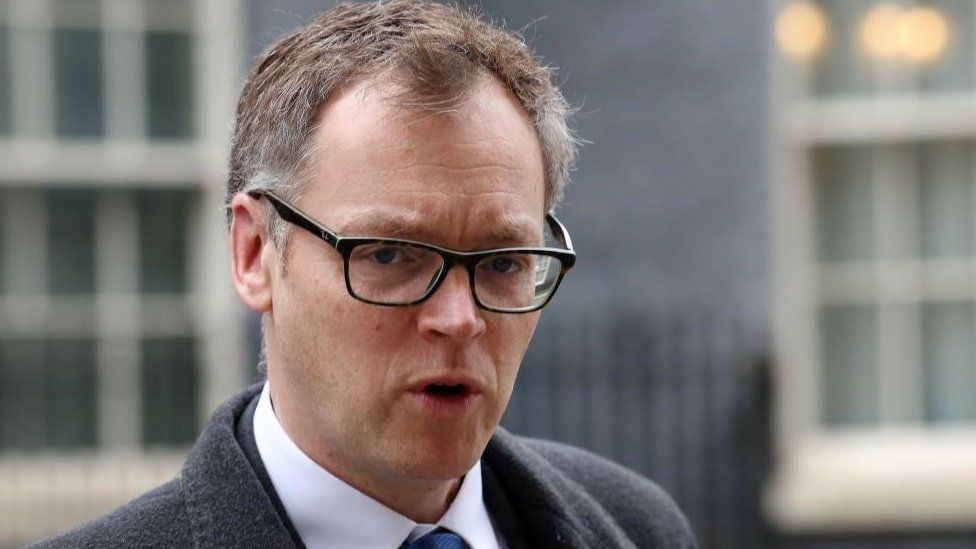
By Sam Francis
Political reporter, BBC News
The government is prepared for a “whole range of legal challenges” after Parliament passed the Rwanda bill, the illegal migration minister has said.
Parliament approved plans to send some asylum seekers to the African country late on Monday night.
But illegal channel crossings will not stop until regular flights to Rwanda “kick in”, Michael Tomlinson said.
The bill is key to the government’s “moral mission” to small boat crossings, he added.
Mr Tomlinson’s comments came as news emerged that five people had died attempting to cross the Channel on Tuesday.
More than 6,000 migrants and refugees have already made the journey so far this year – a rise of about a quarter on the same period last year.
Speaking to BBC Breakfast, which had just showed live footage of people climbing on board a small boat on the French coast, Mr Tomlinson said the bill is not deterring migrants because it is “not yet in force”.
“We need to get the flights off the ground, and that is when we will see the deterrent effect kick in,” he added.
Rishi Sunak said the first flights under the scheme are scheduled in 10 to 12 weeks, but this could still be held up by challenges in the courts.
Labour’s shadow home secretary Yvette Coopers predicted the Rwanda Bill will “unravel over the next few weeks”.
Ms Cooper called plan an “expensive gimmick that is not a serious plan to actually tackle the problem”.
The scheme will cost “half a billion pounds” to deal with “less than 1% of asylum seekers”, she told the BBC.
Charities have also hit out at the scheme, with leading human rights groups describing it as a “breach of international law”.
The Council of Europe, of which the European Court of Human Rights is part, said the bill raised “major issues about the human rights of asylum seekers and the rule of law more generally” and should be scrapped.
More on the UK’s Rwanda asylum bill
A lawyer representing some of those who could potentially be sent to Rwanda have suggested there may be other routes to stop flights taking off.
Nicholas Hughes, a solicitor in the Rwanda litigation team at law firm Duncan Lewis, represents dozens of people who were affected by flights in 2022, and said they are likely to represent clients selected for potential future flights to Rwanda.
He said his clients would be given seven days’ notice if they are chosen to be removed to Rwanda, giving him a “very brief window” to explain to the Home Office why they would be unsafe in Rwanda.
A person’s removal to Rwanda would be rendered unsafe, he said, if they had mental or physical health issues, or were a victim of trafficking or torture, but added that given the time frame, getting that medical evidence could be challenging.
Asked how certain he was that he would be able to prevent clients being sent to Rwanda, he said: “We’ll do everything we can.”
‘Get flights of the ground’
The Safety of Rwanda bill – which was introduced as “emergency legislation” – makes clear in UK law that Rwanda is a safe country and gives ministers the power to disregard some human rights law.
In a statement on Tuesday, Mr Sunak called the passing of the Rwanda bill “not just a step forward but a fundamental change in the global equation on migration”.
He said: “We introduced the Rwanda bill to deter vulnerable migrants from making perilous crossings and break the business model of the criminal gangs who exploit them.
“The passing of this legislation will allow us to do that and make it very clear that if you come here illegally, you will not be able to stay.
“Our focus is to now get flights off the ground, and I am clear that nothing will stand in our way of doing that and saving lives.”
The parliamentary back-and-forth between the Commons and House of Lords saw the bill sent back to MPs five times before peers backed down.
The prime minister achieved a political victory by passing the bill after numerous setbacks.
His pledge to stop small boats crossing the Channel now hinges on this being a deterrent.
With a general election approaching, he has limited time to demonstrate that his plan is effective. Ministers hope to get the flights off by summer, quickly ramping up their frequency to a “regular drumbeat”.
It will also be a stark dividing line at the election, with Labour planning for its abolition.
Speaking on BBC Radio 4’s Today, Mr Tomlinson said he could not give “clarity” on the government’s next steps for detaining, processing and expelling asylum seekers.
On Monday Mr Sunak announced the Home Office had been building extra space in the asylum process to smooth the approach the first flights taking off, including:
- 200 case workers hired
- 25 courtrooms and 150 judges to hear asylum cases, offering 5,000 days in court
- Hardening rules around European Court of Human Rights injunction, making it difficult for the Strasbourg-based court to halt deportation flights
- A pre-booked airfield with slots for commercial charter flights to Rwanda booked
- 500 escorts for the flights, with 300 more in training.
The prime minister announced immigration detention spaces have increased to 2,200 in preparation to send asylum seekers to Rwanda. But this is only enough to hold a fraction of the 52,000 people earmarked for deportation under the government’s plans.








